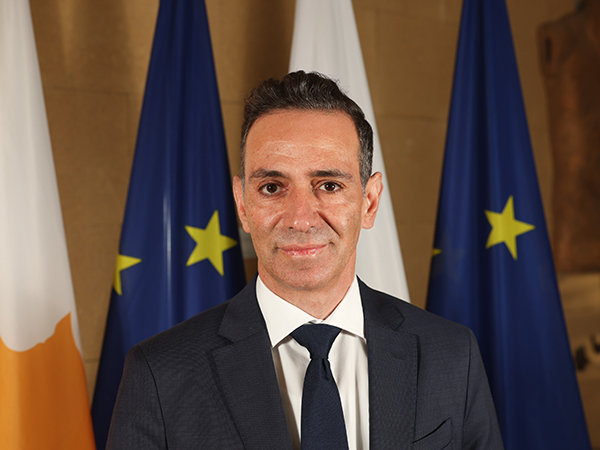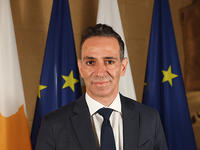Press Releases

18-11-2024 09:30
Address by the Deputy Minister of Research, Innovation and Digital Policy of the Republic of Cyprus, Dr Nicodemos Damianou, at the stakeholders meeting on Electronic Communications and Postal Regulation
Good morning. It is a pleasure to be with you today, among such a diverse and distinguished group of experts, to discuss the challenges and opportunities that are shaping the rapidly evolving fields of electronic communications and postal services.
The topics at hand today – regulatory reforms, cybersecurity, innovation, and the critical infrastructure that underpins our connectivity – are interconnected and key to the resilience and the sustainability of our digital ecosystem. A collaborative approach between government, regulators, industry, academia, and civic society is thus particularly important in addressing these matters, to the benefit of our economy and our society.
Advancing our national digital ecosystem is a key target for our government. In line with Europe’s Digital Decade targets, we have put forward targeted actions, supported by the Recovery and Resilience Plan (RRP), to boost our performance and capabilities, build secure and resilient digital infrastructures, and enable all citizens access and use of digital technologies. To this end, affordable, high-quality connectivity is key.
Cyprus is making good progress in deploying gigabit connectivity infrastructure across the country. To increase availability and stimulate fixed broadband take-up, the Government is subsidising household connections or upgrades to higher speeds through the “Connectivity Voucher Scheme”, a €12 million investment already utilised by more than 70,000 households throughout the island. In addition, the Government is funding gigabit coverage in underserved areas across the country. By the end of 2025, we aspire to be potentially the first European Union (EU) country to achieve 100% population coverage for both 5G and fibre optic high-capacity connectivity.
At the same time, our aim should be to capitalise on our geostrategic location and leverage Cyprus’ role as a regional data gateway, able to serve businesses looking for a reliable, scalable, and secure data platform connecting Europe to the surrounding high-growth markets. Back in 2021, the European Commission defined its strategy for Europe to become the world’s number one data and connectivity hub. As part of this strategy, four data gateways were identified as the platforms/corridors, connecting Europe with the rest of the world. Cyprus has a natural and vital role to play in the EU-Mediterranean corridor. Our country is already well connected in terms of submarine fibre-optic cabling, with a robust network of 12 submarine cables connecting the island to global markets, and we believe that there is potential here to tap into. That untapped potential is part of our current efforts; the Memorandum of Understanding (MoU) we recently signed with Khazna, one of the largest data centre operators in the region and a member of the G42 group, is one such example. Let us not forget: data and connectivity are fundamental prerequisites to the new AI-driven future we are already a part of.
But there is one more prerequisite: talent. To adhere to the leaving-no-one-behind principle, we also need to address digital education and skills. Addressing the digital literacy gap is essential – and may I say, a very challenging one – to ensure that every citizen has the skills and the confidence to navigate and actively participate in the digital world. In the context of our national RRP, more than €24 million is being invested in short and long-term initiatives, aimed at bridging digital literacy, digitally transforming education and building a strong, tech savvy workforce, able to steer digital transformation forward. This on top of reforms to attract talent. Cyprus has seen one of the highest jumps in Europe regarding the percentage of Information and Communication Technologies (ICT_ specialists on the latest Digital Decade report issued a few months ago; a 17% increase to be exact. However, the lack of talented individuals remains a major challenge (across Europe).
At the same time, we are focusing on ongoing initiatives in the e-government sphere, following a two-tier approach: modernising the backbone technology infrastructure of public administration, while at the same time providing useful digital tools and services to our citizens and digitising large vertical segments of the economy and public administration. Cross market, backbone infrastructure services, such as the national eID, the subsidisation of which we announced last month, are essential elements of our strategy. Such backbone services enable businesses and organisations to digitise their processes, build new products, new services and new business models, and ultimately grow the market.
As we expand our digital ecosystem, safeguarding the security and resilience of our infrastructure becomes paramount. Cyberattacks are evidently now converging with attacks on physical critical infrastructures. Cyprus’ geostrategic location places us at the crossroads of global connectivity, making the protection of critical assets such as subsea cables and high-capacity networks a national priority. To that end, we are actively participating in EU-wide initiatives to enhance submarine cable security and adopting regulatory frameworks that safeguard these vital lifelines against physical and cyber threats.
Dear guests,
Today’s discussions on regulatory reforms come at a crucial juncture. As the EU strives for greater harmonisation in spectrum management and telecommunications regulation, it is essential to strike a balance that respects the unique needs of member states while fostering a unified digital market. Cyprus actively advocates for “smarter, well-designed, streamlined, and investment-friendly regulation” that respects member states’ unique circumstances (those of small states, for example), rather than a more stringent, centralised approach that minimises administrative burdens while encouraging investment and innovation.
We believe that the existing framework, including the European Electronic Communications Code (EECC), already provides sufficient tools to improve spectrum management without necessarily the need for additional regulation. Allowing more time for the full implementation of the EECC could ensure a well-functioning, harmonised market while preserving local control.
Given this opportunity, let me say that we are currently exploring the utilisation of the millimetre wave bands for furthering 5G development on the island. In this initial phase, we plan to offer interested operators the opportunity to use these bands for pilot applications, enabling them to test and evaluate the available equipment. These pilot licenses are expected to be issued promptly, facilitating innovation while maintaining a balanced regulatory framework.
The role of the national regulatory authority, the Commissioner of Communications, is instrumental in this context, ensuring effective oversight, promoting fair competition, and safeguarding consumer interests, while enabling the adoption of EU-wide policies that support the country’s digital transformation objectives.
Let me close by pointing out that the convergence of telecom and cloud services, along with the push for greener digital networks, presents both challenges and opportunities. By prioritising sustainability and embracing emerging technologies such as Artificial Intelligence (AI) and Internet of Things (IoT), we can position ourselves right there with the leaders in the digital transition. AI, in particular, is amongst our highest priorities. We are currently working to ensure compliance with the provisions of the AI Act, while working on forming a mechanism to select and fund specific AI use cases that can be applied in the public sector. Such advanced technologies are a key focus area of the Research and Innovation Foundation’s funding programmes – I am sure you will hear a lot about this within the day.
Dear guests,
The very fast-moving pace we are forced to follow is both challenging and promising. I hope today’s exchange of views and insights will form the basis for even more efficient reforms, policies and measures that will advance the digital landscape in our country and maximise its impact.
Thank you.
(NZ/GS)
Relevant Press Releases





